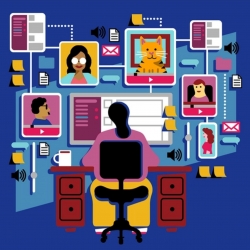January 13, 2022
Search Results for: people management
January 5, 2022
‘Great Resignation’ offers a one off opportunity to rethink our relationship with work
by Pip White • Comment, Flexible working, Technology, Wellbeing
 After nearly two turbulent years, which for many knowledge workers have been dominated by a ground-hog day like existence, people are looking for change. This is only natural as workers around the world are re-evaluating their priorities, reigniting their passions, or simply looking for something new. This has led to a mini-exodus from businesses, which is now being dubbed the ‘Great Resignation’. (more…)
After nearly two turbulent years, which for many knowledge workers have been dominated by a ground-hog day like existence, people are looking for change. This is only natural as workers around the world are re-evaluating their priorities, reigniting their passions, or simply looking for something new. This has led to a mini-exodus from businesses, which is now being dubbed the ‘Great Resignation’. (more…)
January 5, 2022
Warning over worker welfare on 2022’s first day ‘not back in office’
by Jayne Smith • Flexible working, News, Wellbeing
 The 4th January was the first working day of 2022 for many employees, but due to ongoing working from home restrictions the majority will not be attending their usual workplaces. According to the latest research from the Institute of Workplace and Facilities Management (IWFM), more than half of office workers had expected to be back in the office today, and three quarters would have been back by the end of this week. (more…)
The 4th January was the first working day of 2022 for many employees, but due to ongoing working from home restrictions the majority will not be attending their usual workplaces. According to the latest research from the Institute of Workplace and Facilities Management (IWFM), more than half of office workers had expected to be back in the office today, and three quarters would have been back by the end of this week. (more…)
January 4, 2022
Hybrid working will demand leaders develop new communication skills
by David Mills • Comment, Flexible working
 Keeping on top of communication barriers in the business world can feel like an endless game of Whac-A-Mole, especially now in the new era of hybrid working. The usual culprits are well-known by now: patchy WiFi connections, crashing computer programmes, cloud syncing issues, important emails sneaking into spam folders – the list goes on. All can impede our ability to get the job done. (more…)
Keeping on top of communication barriers in the business world can feel like an endless game of Whac-A-Mole, especially now in the new era of hybrid working. The usual culprits are well-known by now: patchy WiFi connections, crashing computer programmes, cloud syncing issues, important emails sneaking into spam folders – the list goes on. All can impede our ability to get the job done. (more…)
December 15, 2021
Company culture, linked to share price, funding success and growth
by Jayne Smith • Business, News, Working culture
 A new research report from Culture Amp, claims that company workforces’ overall confidence as well as employees’ belief in their leaders are the biggest differentiators when it comes to achieving sustained stock price increases between July 2020 and June 2021. (more…)
A new research report from Culture Amp, claims that company workforces’ overall confidence as well as employees’ belief in their leaders are the biggest differentiators when it comes to achieving sustained stock price increases between July 2020 and June 2021. (more…)
December 14, 2021
Why employee development is vital in manufacturing
by Freddie Steele • Company news
 Employee development is vital in any sector of work. Your business is only as good as the employees you have on board working with you to drive it forward. Continuously developing these employees and enriching their careers is a vital part of ensuring that they are happy and fulfilled at work. (more…)
Employee development is vital in any sector of work. Your business is only as good as the employees you have on board working with you to drive it forward. Continuously developing these employees and enriching their careers is a vital part of ensuring that they are happy and fulfilled at work. (more…)
December 10, 2021
Artificial Intelligence to guide organisations through new challenges
by Jayne Smith • News, Technology
 The World Economic Forum published the “Human-Centred AI for Human Resources: A Toolkit for Human Resources Professionals” to scale the responsible use of artificial intelligence in Human Resources (HR). The toolkit includes a guide covering key topics and steps in the responsible use of AI-based HR tools, and two checklists – one focused on strategic planning and the other on the adoption of a specific tool. (more…)
The World Economic Forum published the “Human-Centred AI for Human Resources: A Toolkit for Human Resources Professionals” to scale the responsible use of artificial intelligence in Human Resources (HR). The toolkit includes a guide covering key topics and steps in the responsible use of AI-based HR tools, and two checklists – one focused on strategic planning and the other on the adoption of a specific tool. (more…)
December 6, 2021
Hybrid working success relies on three key factors
by Jayne Smith • Flexible working, News
 Organisations must focus on equipping people managers, who are the stewards of sustainable performance, with the right skillsets to ensure they and their teams succeed in the hybrid working world, according to Gartner, Inc. To achieve this, Gartner recommends organisations pursue three tactics to ensure managers are prepared to lead their teams in this setting. (more…)
Organisations must focus on equipping people managers, who are the stewards of sustainable performance, with the right skillsets to ensure they and their teams succeed in the hybrid working world, according to Gartner, Inc. To achieve this, Gartner recommends organisations pursue three tactics to ensure managers are prepared to lead their teams in this setting. (more…)
December 1, 2021
Longer lives significantly contributing to European economies, new reports claims
by Neil Franklin • News, Wellbeing
 A series of reports published by the International Longevity Centre UK (ILC) highlights the economic opportunities of longer lives across Europe. According to the reports, older people’s contributions across the European region are significant, and growing. The reports call for countries to better support older people’s economic contributions, particularly through greater investment in preventative health measures that support healthy ageing – the authors call for governments to invest at least 6 percent of their health budgets on these interventions, such as vaccines, screenings, early detection and management of disease. (more…)
A series of reports published by the International Longevity Centre UK (ILC) highlights the economic opportunities of longer lives across Europe. According to the reports, older people’s contributions across the European region are significant, and growing. The reports call for countries to better support older people’s economic contributions, particularly through greater investment in preventative health measures that support healthy ageing – the authors call for governments to invest at least 6 percent of their health budgets on these interventions, such as vaccines, screenings, early detection and management of disease. (more…)
November 26, 2021
Doing what you love may not automatically make you happier at work
by Dr Tracy Brower • Features, Wellbeing, Workplace
 There is a classic saying which has shaped our job choices for years: “Do what you love, the money will follow.” New research suggests this may be true, although not in the way it was originally conceived. The typical logic train has suggested job interest shapes satisfaction and, in turn, satisfaction may drive better performance. However, new research published in the Journal of Vocational Behavior provides some fresh perspectives. It turns out satisfaction has many facets. While interest is one component in job satisfaction, it is not the primary component. Elements such as the organization, relationships with colleagues, leadership and compensation are actually more important than interest in predicting satisfaction. (more…)
There is a classic saying which has shaped our job choices for years: “Do what you love, the money will follow.” New research suggests this may be true, although not in the way it was originally conceived. The typical logic train has suggested job interest shapes satisfaction and, in turn, satisfaction may drive better performance. However, new research published in the Journal of Vocational Behavior provides some fresh perspectives. It turns out satisfaction has many facets. While interest is one component in job satisfaction, it is not the primary component. Elements such as the organization, relationships with colleagues, leadership and compensation are actually more important than interest in predicting satisfaction. (more…)
November 26, 2021
Untrained managers more likely to change jobs in 2022
by Jayne Smith • Business, News, Working culture
 Employers looking to retain talent during the so-called ‘Great Resignation’ may benefit from investing in more management training for their staff, according to Digits. New research suggests that managers who haven’t received any management training are 36 percent more likely to leave their current jobs in the next year, than managers who receive regular management training (38 percent compared to 28 percent). (more…)
Employers looking to retain talent during the so-called ‘Great Resignation’ may benefit from investing in more management training for their staff, according to Digits. New research suggests that managers who haven’t received any management training are 36 percent more likely to leave their current jobs in the next year, than managers who receive regular management training (38 percent compared to 28 percent). (more…)






 Members of flexible workspace provider
Members of flexible workspace provider 
















January 11, 2022
Great Resignation offers firms a chance to create the Great Retention
by Erin Eatough • Comment, Flexible working, Wellbeing, Working culture